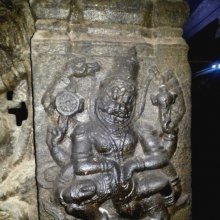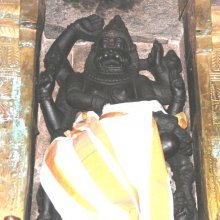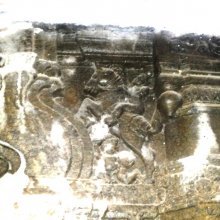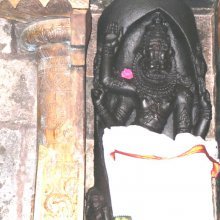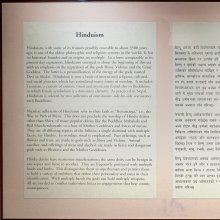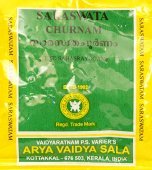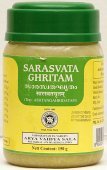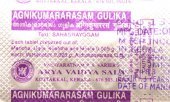Ugra, Ugrā: 42 definitions
Introduction:
Ugra means something in Buddhism, Pali, Hinduism, Sanskrit, Jainism, Prakrit, Marathi, Hindi, biology. If you want to know the exact meaning, history, etymology or English translation of this term then check out the descriptions on this page. Add your comment or reference to a book if you want to contribute to this summary article.
Ugra has 40 English definitions available.
Images (photo gallery)
(+2 more images available)
Languages of India and abroad
Sanskrit dictionary
[Deutsch Wörterbuch]
Source: Cologne Digital Sanskrit Dictionaries: Böhtlingk and Roth Grosses Petersburger WörterbuchUgra (उग्र):—
--- OR ---
Ugra (उग्र):—(ugra [Uṇādisūtra 2, 28])
1) rājan (Gegens. mṛdu) [Mahābhārata 12, 3785.] yathā madhuramugraṃ vā śṛṇoti labhate vā [Spr. 4959.] bestimmte Nakṣatra, die ugrāṇi heissen, [WEBER, Jyotiṣa 95. Nakṣ. 2, 385.] [Varāhamihira’s Bṛhajjātaka S. 33, 19. 98, 8]; vgl.
2) e) —
2) a) [Oxforder Handschriften 54,a,1.] — d) ein Kāpālika [Oxforder Handschriften 257,a,12.] — e) vgl. oben u. [1]). — f) pl. Name einer Śiva'itischen Secte [WILSON, Sel. Works 1,17.] [Oxforder Handschriften 248,a,7]; vgl. ekādaśe dvāpare tu ... vyāso bhaviṣyati . tadāpyahaṃ (Śiva spricht) bhaviṣyāmi gaṅgādvāre kalerdhuri .. ugrā nāma mahānādāstatraiva mama putrakāḥ . bhaviṣyanti mahaujaskāḥ u.s.w. [52,b,15. fgg.] — Vgl. atyugra .
Source: Cologne Digital Sanskrit Dictionaries: Sanskrit-Wörterbuch in kürzerer FassungUgra (उग्र):——
1) Adj. (f. ā) gewaltig , heftig , über die Massen stark , — gross , — streng , grausig. Bez. best. Mondhäuser. —
2) m. — a) ein Gewaltiger , Grosser , Vornehmer ; ein gewaltthätiger , leidenschaftlicher Mensch. — b) Beiname Śiva’s oder Rudra's. — c) Nomen proprium eines Rudra [Viṣṇupurāṇa 1,8,7.] [Bhāgavatapurāṇa 6,6,17.] — d) der Sohn eines Kriegers (Vaiśya Comm. zu [Āpastamba’s Dharmasūtra]). von einer Śūdrā [Āpastamba’s Dharmasūtra 1,7,20.21.] [Gautama's Dharmaśāstra 4,16.] — e) *Hyperanthera Moringa. — f) Nomen proprium eines Dānava und verschiedener anderer Personen. — g) Pl. Name einer Śiva'itischen Secte. —
3) f. ugrā — a) Bez. verschiedener Pflanzen (Artemisia_sternutatoria Roxb. , Coriandrum sativum , = akṣatā und vacā). — b) die Tochter eines Kriegers von einer Śūdrā. — c) eine best. Śruti [Saṃgitasārasaṃgraha 23.] —
4) f. ugrī Pl. Bez. best. dämonischer Wesen [Atharvaveda 4,24,2.] —
5) *n. die Wurzel von Aconitum ferox Wall.
Sanskrit, also spelled संस्कृतम् (saṃskṛtam), is an ancient language of India commonly seen as the grandmother of the Indo-European language family (even English!). Closely allied with Prakrit and Pali, Sanskrit is more exhaustive in both grammar and terms and has the most extensive collection of literature in the world, greatly surpassing its sister-languages Greek and Latin.
See also (Relevant definitions)
Starts with (+143): Ugra-habe-amri, Ugrabagara, Ugrabahu, Ugrabala, Ugrabandha, Ugrabha, Ugrabhairava, Ugrabhata, Ugrabhuti, Ugracancu, Ugracanda, Ugracarin, Ugracarini, Ugracarya, Ugracaya, Ugrachanda, Ugracharini, Ugrachaya, Ugradamshtra, Ugradamshtri.
Ends with: Abhyugra, Anugra, Atyugra, Bhimogra, Bhugra, Chaulmugra, Chhalmugra, Ghugra, Kattugra, Kesar mugra, Kshugra, Mahogra, Mugra, Paribhugra, Satyamugra, Shapanugra, Tugra, Tyugra.
Full-text (+377): Ugradanda, Ugratva, Ugrampashya, Ugrasena, Ugragandha, Ugrashekhara, Ugradhanvan, Ugranasika, Ugracaya, Ugresha, Ugrakanda, Augrya, Ugracanda, Ugga, Ugrajati, Ugraretas, Ugradamshtra, Ugrabhairava, Ugratara, Ugrashoka.
Relevant text
Search found 85 books and stories containing Ugra, Ugrā; (plurals include: Ugras, Ugrās). You can also click to the full overview containing English textual excerpts. Below are direct links for the most relevant articles:
Rig Veda (translation and commentary) (by H. H. Wilson)
Garga Samhita (English) (by Danavir Goswami)
Verse 5.18.13 < [Chapter 18 - Uddhava Hears the Gopīs’ Words and Returns to Mathurā]
Verse 1.9.14 < [Chapter 9 - Description of Vasudeva’s Wedding]
Verse 1.6.34 < [Chapter 6 - Description of Kaṃsa’s Strength]
Manusmriti with the Commentary of Medhatithi (by Ganganatha Jha)
Verse 10.6 < [Section II - Mixed Castes]
Verse 10.49 < [Section IV - Occupations of the Mixed Castes]
Verse 10.19 < [Section II - Mixed Castes]
Baudhayana Dharmasutra (by Georg Bühler)
Rudra-Shiva concept (Study) (by Maumita Bhattacharjee)
1. Epithets and Attributes of Rudra-Śiva (Introduction) < [Chapter 6a - The Epithets of Rudra-Śiva]
2.5. Rudra as Ugra < [Chapter 6a - The Epithets of Rudra-Śiva]
3. The God Rudra-Śiva: His Prominence < [Chapter 1 - Introduction]
Sutrakritanga (English translation) (by Hermann Jacobi)
Related products
